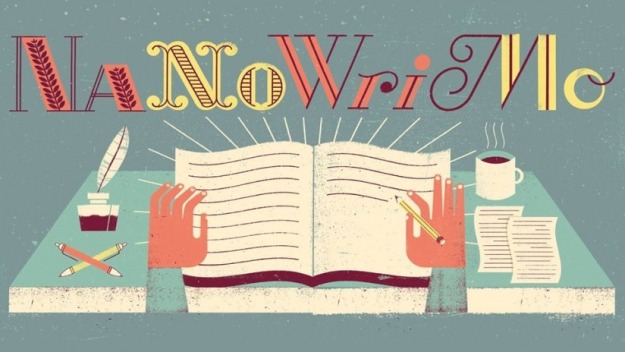
So, as some of you may know, I spent November of this year writing just over 50,000 words in 30 days. It was INTENSE, it was unbelievable, it was better than I’d hoped and nothing like what I’d expected. I decided to write down some lessons, mostly for myself for the next time I decide to try NaNo, but also for anyone who might want to read my conclusions from attempting and successfully completing NaNo for the first time.
Why did you do NaNoWriMo?
I’ve wanted to do NaNo for at least 5-7 years, and always wished I’d had the time in November to write every day. But until last year I was in undergrad and then in grad school (while working full time) and November was too packed with school things and I knew I’d have to either sacrifice academics or sacrifice writing at some point and I didn’t want to go on this stressful, intense journey already knowing I would fail. (You can set any word goal for NaNo, of course, but I found it counterproductive to do the challenge at a time when I knew there was no way I’d get to 50k).
Why did you decide to do NaNo in 2018?
First, because I handed in my Master’s thesis last November, so this year was the first time I was a free elf \o/ and could realistically dedicate myself to NaNo.
Second, because I’ve been working on a Fantasy novel for the last few years and once I’d handed in my thesis I was able to work on it even more, so by October 2018 I finally had a complete outline! Three acts, all the characters and emotional arcs, I had a beautiful, reasonably detailed structure that was ready for demolition by the cruel reality of actually writing a book.
It just so happened that I’d spent the last two weeks of October freaking out in the general direction of all my friends that I had to, like, actually write a first draft now, and that was terrifying because you couldn’t take a first draft back. Once you started, it would always be there, in the back of your mind, as something you didn’t manage to complete, or in an extremely, extremely unlikely case it would grow into a published book.
So, after freaking for a while, I finally sat down to write the draft on October 31st. And then promptly realized the next day that everyone was talking about NaNoWriMo, and hey, I could actually just do that instead of writing my draft without a clear schedule? I signed up on the website on November 1st and that was that.
So what did you actually learn?
Wait! Before we get into that: let me say up front that all the advice I’m about to offer may not work for you. For example: I love deadlines. I’m mostly not a discovery writer, so I could only write a good draft quickly if I already had an outline.
Another fact: the most necessary thing for completing NaNoWriMo is time to write, if not every day then a reasonable amount a week. For most people, this means a certain freedom from obligations – professional, family, health related. I had a full time job and a disability (still do!) and NaNo was a huge challenge, time-wise. Maybe the most important thing I learned was how privileged I was to have the time that I did, and how easily I could have lost that time, if my health had been even slightly worse, or if family obligations had been greater that month.
Please remember that and be kind to yourself.
Actually, please be kind to yourself in general!
#1: Log your words immediately
Most of the people I’d talked to who’d done NaNo were writing their text somewhere – a Word file, Google Docs, email drafts on their phone, whatever, occasionally checking the word count until they hit 1667 words for the day, and then logging that into the NaNo website, sometimes putting in the amount they’d accumulated over several days.
When I was struggling to get the words out I started putting my word count into the NaNo website much earlier. Starting with the first 500 words or so I’d managed to write that day. Then I started putting any round number into the website – 300, 400, etc.
And then finally, in the last 10 days, I started putting my word count in from the very first sentence or paragraph. I started registering 27 words, 32 words, 47 words.
Once you put in that number the total word count for the project doesn’t change much, especially later in the month. But for some reason instead of staring blankly at the page, letting the website know I’d produced 27 words already spurred me on and gave me a happy little note to focus on, instead of the negativity of all the words I still had to get done.
I found that if I was stuck on beginning my output for the day I’d just write a sentence or two, put the number into the website, save it, then write a few more sentences, do the same, then a few more, and then the words started flowing much quicker.
Usually my updates on the website went like this: 27 -> 48 -> 89 -> 156 -> 320 -> 670 -> 1123 -> 1662
Sometimes it even went: 27 -> 48 -> 156 -> 620 -> 1662
Obviously the exact numbers varied by day, but you get the idea. It really taught me the power of positive reinforcement and how even the smallest sense of achievement can give you momentum to go forward (I’d always assumed that the danger of small achievements was that you’d not want to keep going now that you’d gotten to feel good about Doing the Thing. Turns out it works the other way around, at least for me.)
#2 Give yourself as much positive reinforcement for writing as possible
Sticking with the theme from the first point, I’d always liked Written? Kitten! as a writer, and thought it was a cute idea to get pictures of cats (or any other object, you can change the parameters!) for every 100 words. But I never used it consistently when writing, I found it distracting and it felt like more of a cute gimmick.
With NaNo it became my lifesaver. I literally had it open in a tab next to my draft every single day. My process went: get to 100 words, and from there whenever you feel stuck, even a little, use either WK or the NaNo website to give yourself a tiny boost of accomplishment and positive reinforcement. Do I have another hundred words yet? If not, add what I do have to my word count on the NaNo website, and look at the stats change, even just a tiny bit.
If I do have over 100 new words? Put them into WK and get a lovely new cat.

Observe the cat for a moment, look at its majestic fluffiness, let yourself feel joy at the thought of this cat’s existence, imagine yourself petting the cat. Doesn’t that feel nice? The cat wants you to succeed. It’s happy to see you here, making a hundred words happen, so it can meet you. Don’t you want to meet another cat?
Great, back to the draft!
I won’t deny this sounds pretty ridiculous, but for me going from writing a short story in 2 months to writing 50,000 words in a month was also pretty ridiculous. Whatever works.
#3 Plan for not getting anything else done in November
On November 1st I thought to myself – I can totally write every day for a month. I’ll do it after work and on weekends, it’ll mean I’m a bit busier, but it won’t be that big of a deal.
But the thing I didn’t realize was that every day meant EVERY. SINGLE. DAY. And most days getting the words out is HARD, it takes a WHILE and it’s mentally exhausting if you’re not used to it (or at least it was for me). Some days you won’t be able to get to 1667 and you’ll have to make it up on other days. Some days you’ll have commitments that can’t be postponed and you’ll be at zero.
A selection of random events that I didn’t realize would fall in November and take up my time: late Halloween parties, Thanksgiving, winter holidays related shopping, Black Friday with its endless digital sales. None of these things were crucial to my survival, but I didn’t realize how much NaNo would mean not having time for ANY of it. And while it’s possible to take days off during NaNo, I found that more than one day “off” in a row could be disastrous for me. So if I did want to fit something in – for example, shopping for gifts for my loved ones – I had to plan for it, and know I would “pay” for it later.
I got a lot of non-NaNo things done in November (I took time off NaNo to write an article about Magic and Romance and KJ Charles for Tor.com for example!) but I wish I’d been smarter and realized I needed to clear my plate AS MUCH AS POSSIBLE for November and pause as few commitments as possible because just keeping up with NaNo would be exhausting.
#4 It’s OK to have zero-words days sometimes
At some point in November you will probably have a zero words day. Maybe it’ll be because of an event you can’t miss or postpone, maybe something unexpected will land in your lap, or maybe you’ll just feel so goddamn exhausted after getting everything else done that day that you won’t have the brain to write before the clock strikes midnight.
Going into NaNo, I was really worried I’d lose momentum and get discouraged if I started missing days, especially once I realized how hard I had to work just to keep up. For me, the idea of actually getting to 50k in a month seemed so unlikely and impossible that I knew if I let myself get too far behind I’d quickly starting *believing* I couldn’t do it, even if in reality I still had a chance.
In total, I took 5 days “off” from NaNo in November. Sometimes it was other commitments (like writing an article), sometimes it was exhaustion and sometimes it was simply disability, which ensured I couldn’t get the words out that day.
There were two rules I tried to set for myself regarding “missed” days.
- Never two missed days in a row. Making up 1667 words in addition to my regular daily word count was hard enough, I feared missing two days would leave too big of a gap and my brain would just start believing I couldn’t do NaNo.
- Let myself make up the word count gradually, instead of feeling stressed that I had to make it up as soon as possible, preferably the very next day.
I told myself I had to sacrifice that daily sense of achievement for the 5-6 days, after a zero-words day, and know that I would slowly close that gap, with a few hundred words at a time.
So for example if I had a 1667 word deficit on Sunday, it would grow smaller like this:
Sunday: 1667
Monday: 1320
Tuesday: 988
Wednesday: 610
Thursday: 267
Friday: 0
Keeping it to a few hundred words a day, instead of feeling like I had to write twice my usual output in one day to make up for it, kept the anxiety about being “behind” manageable. Also, with this plan I was still writing under 2000 words a day, and staying in the 1667-2000 range seemed less scary than knowing I had to write over 2000 all at once.
(I had days when I wrote over 2000, and even over 3000 words, but they weren’t days when I HAD to write that much, which made a huge difference to my stress levels.)
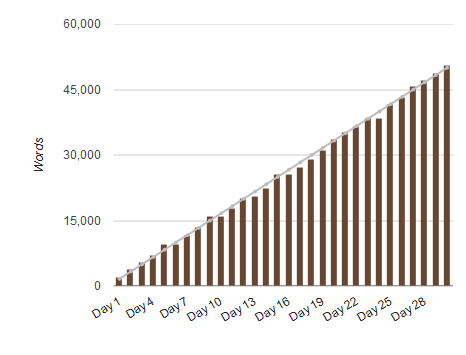
Here’s a detailed chart of my daily word counts. You can see that occasionally there’s a dip in the daily graph, for example on day 16 and day 23, that then slowly gets filled up over the next few days.
#5 Track how much time you’re spending on NaNo
One of the things no one told me about NaNoWriMo is that the website offers the option of tracking hours spent working instead of words produced. (Even some of my friends who’d done NaNo before were surprised to learn this!)
When I started NaNo I didn’t actually think I’d get to 50k (as I was writing from an outline I was determined to produce decent quality prose and not simply write to stretch my writing muscles and make word count no matter what, so getting to 50k seemed unlikely) so instead I set myself some alternative goals.
I decided that the most I could realistically hope for would be 25,000 words. If I got that done, it would be a HUGE achievement.
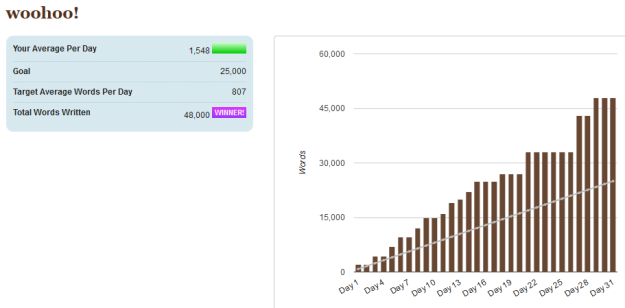
(Luckily I was able to surpass 25,000, but having that reminder that this is what I’d realistically aspired to was important, again as a form of positive reinforcement to keep myself going.)
But I wanted to know I’d still feel accomplished, even if I didn’t produce 25k. I wanted to know I’d given NaNo my all, and really invested more in writing in November than ever before. So I decided to track the one thing I could control much better than my creative output – the time I spent trying to write.
So I set myself a goal of 40 hours, the equivalent of a full time work week (minus the lunch breaks). Basically, could I work 5 weeks instead of 4 in November, where one week was my writing job on top of my regular job?
To give you an idea, on an average week I spend about 5 hours writing. That’s about 20 hours a month. NaNo would mean doubling that, which was a huge commitment for me, and as we’ve discussed required clearing my schedule and missing out on a lot of things.

Here’s the graph for hours spent writing. I updated this every 2-3 days sometimes, which is why it looks uneven. I also ended up writing for about 43 hours, but I didn’t know the website wouldn’t let you update stats after the last day, so I never did log those last few hours.
On the tough days, when I wasn’t sure if I would make the word count, having that time tracker was a lifesaver. No matter what, even if I only managed 10,000 words, or less than that, I would know I was making huge strides, huge sacrifices, and giving writing the book my very best shot. I could look at that graph and know that whatever my word output, there was tangible proof that I was doing more work than ever before.
I highly, highly recommend that to anyone who isn’t sure if they can do 50k in a month and who is as anxiety prone as I am.
What’s next?
Of course, my novel will not be 50,000 words long (this is true for most Fantasy novels). I estimate the first draft will be between 75,000 and 85,000 words (I feel even more confident in that assessment now that I’m 50,000 words in). My book has three parts, and NaNo got me right to the beginning of part 3, as I thought it would.
I forced myself to take a “vacation” from writing in the first week of December, and didn’t actually touch my draft, or any of the commitments I’d set aside while I was too busy with NaNo. I needed that break, my brain needed that break. I was sleep deprived and emotionally exhausted from writing so much story so quickly.
I thought I’d spend the second week of December catching up on everything writing-related that didn’t get done in November: going over line edits for a short story that will be published in an anthology next year, writing a short story as a present for a friend, writing this post while my memories of NaNo were fresh, other bits and bobs like replying to editors and sending out stories.
Of course, only one week was not nearly enough for that. Here we are at the end of it, and I’ve barely gotten 50% of these things done. I’ve decided to give myself as much time as I need to really clear my plate so I can dive back into the final 30,000 words of my draft without feeling constantly torn about lagging commitments. NaNo taught me how stressful that can be.
So, wish me luck for the next 30,000 words? I hope to get them started in 2018, but no doubt I’ll be doing the majority of the work in 2019. What a scary, exciting prospect for the new year 🙂
Can we read some of your manuscript???
I’m not sure any of you actually want to do that, but I know I was always curious to see the quality of writing authors can produce during NaNo, and to see how rough it really was. I can tell you that by my own estimation, my 50,000 is about 10% “worse” than the same prose would have been if I’d written it without NaNo, in my own sweet time. I know this about myself: my first drafts aren’t really readable yet, they’re just fodder that will later turn into a second draft, that I will actually hopefully be able to send beta readers.
But as long as we’re all here, and as long as you’re curious (I mean, if you’re still reading I have to assume that you are), here’s a short bit from the draft, towards the start of the book, in which a queen and her mother are discussing the queen’s upcoming wedding.
“It was purely a courtesy that her mother announced herself, instead of simply barging in as she was in the habit of doing, like a reminder that nothing, not this palace, or the country at large, or even Elro’s private rooms were truly hers.
“I won’t ask for an apology,” her mother began, as soon as she was ushered in. Elro stood by her bed, dressed in a thin shirt and a robe. She usually had someone read to her while she fell asleep. “But I hope you at least realize how inappropriate your behavior has been.”
Elro struggled not to roll her eyes. That wouldn’t make this go any faster. “Do enlighten me.”
“The Regent has sent you an ideal match. A boy from the main branch of the Yaritemi clan. His dowry is the equivalent of two months’ taxes for your treasury. He comes with a pristine reputation. Nothing but glowing accounts, from his tutors to his peers.” Her mother’s face hardened. “And what do you do? Turn a cold shoulder, act like a distant relative invited to the wedding party.”
That did make Elro roll her eyes. “Am I supposed to court him? The wedding is a week away, it’s a bit late for that. And surely you don’t want me to touch him before then, so what am I supposed to do?”
Her mother spread her hands in exasperation. “Talk to him! Show some initiative, some leadership! Remind him he’s marrying a queen, not a servant.”
“Is that what you did with Father?” Elro asked.
Her mother’s face went dark. “Your father, may his soul rest with the ancestors, was a model of chastity, loyalty and manners. He was in a unique position, a man ruling over a country, having to display all the strength of a woman while maintaining his own caring nature. He welcomed me warmly and made sure I never felt awkward at court.”
“And were you the best bride the Regent had to offer?” Elro asked.
Her mother hesitated. This was a sure way to get under her skin. “We were a very good match, yes.”
Not the question Elro had asked. Not that it mattered, she already knew the answer.”
I know not everything about that excerpt makes sense, but I hope that gives you a little glimpse?
Thank you for reading this far, and I hope you’ll wish me luck in finishing this book some day? And also that any of what I’ve said about NaNo will be useful to you in your own writing.
 Hello again, friends!
Hello again, friends!
 I had some thoughts about French director Céline Sciamma’s movie
I had some thoughts about French director Céline Sciamma’s movie 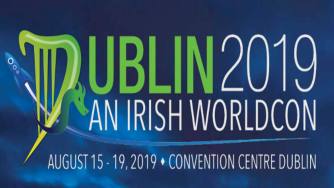 In about a week I’ll be arriving in Dublin to attend
In about a week I’ll be arriving in Dublin to attend  At the start of 2018 I had a few writing goals: spend the first six months of the year writing short stories (hopefully about one a month) and the last six months working on my novel draft. I hoped I’d have half of my first draft done by 2019, but I knew these were very optimistic plans.
At the start of 2018 I had a few writing goals: spend the first six months of the year writing short stories (hopefully about one a month) and the last six months working on my novel draft. I hoped I’d have half of my first draft done by 2019, but I knew these were very optimistic plans.




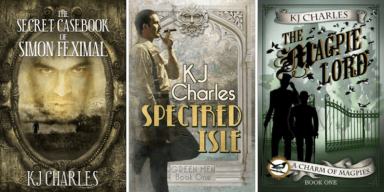 Hello friends! I’ve found that I usually write up to 4 non-fiction articles a year these days, that’s a number that seems to balance well with my fiction writing, but in 2018 I got to write 5! I pitched this article right before basically being away from my computer for a month, heard back from the (wonderful) editor while I was traveling in China, had to postpone writing it because of, among other things, a death in the family, and eventually ended up writing it in the middle of (successfully!) doing NaNoWriMo for the first time. So, it’s been eventful around these parts!
Hello friends! I’ve found that I usually write up to 4 non-fiction articles a year these days, that’s a number that seems to balance well with my fiction writing, but in 2018 I got to write 5! I pitched this article right before basically being away from my computer for a month, heard back from the (wonderful) editor while I was traveling in China, had to postpone writing it because of, among other things, a death in the family, and eventually ended up writing it in the middle of (successfully!) doing NaNoWriMo for the first time. So, it’s been eventful around these parts! I have a new poem out in Strange Horizons! It’s called “Survival in Six Easy Steps” and it’s very different from most of the poems I’ve written before. For one thing: it doesn’t have a love story.
I have a new poem out in Strange Horizons! It’s called “Survival in Six Easy Steps” and it’s very different from most of the poems I’ve written before. For one thing: it doesn’t have a love story.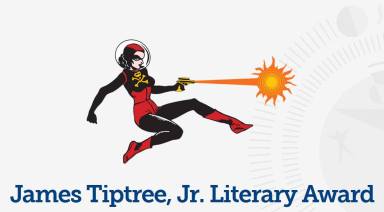 Today I have some really exciting news to share.
Today I have some really exciting news to share. I’m very excited to announce that I have a new poem in the latest issue of Arsenika!
I’m very excited to announce that I have a new poem in the latest issue of Arsenika!